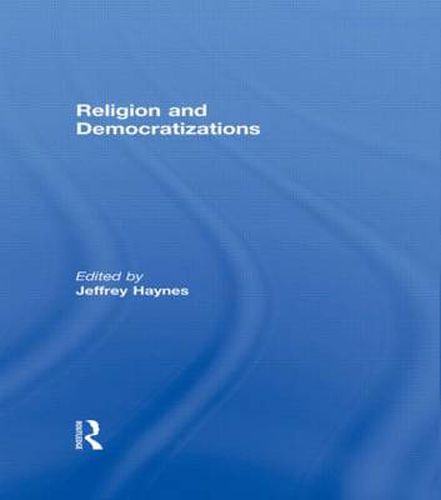Readings Newsletter
Become a Readings Member to make your shopping experience even easier.
Sign in or sign up for free!
You’re not far away from qualifying for FREE standard shipping within Australia
You’ve qualified for FREE standard shipping within Australia
The cart is loading…






This book examines key debates on religion and democratization from three main perspectives: Religious traditions have core elements which are more or less conducive to democratization and democracy; Religious traditions may be multi-vocal – but at any moment there may be dominant voices more or less receptive to and encouraging of democratization; Religious actors rarely if ever determine democratization outcomes. However, they may in various ways and with a range of outcomes be of significance for democratization. The contributions are divided into two sections: (1) Religion, democratization and democracy, and (2) Secularization, democratization and democracy. Overall, they examine the three assertions in the bullet points above. The book’s starting point is that in general around the world, religions have left their assigned place in the private sphere. This means they have in many cases become recognisably politically active in various ways and with assorted outcomes. This re-emergence from political marginality dates back until at least the 1980s. At that time, the US sociologist, Jose Casanova noted that ‘what was new and became news ! was the widespread and simultaneous refusal of religions to be restricted to the private sphere’. This involved a remodelling and re-assumption of public roles by religion, which theories of secularisation had long condemned to social and political marginalisation. This book was published as a special issue of Democratization.
$9.00 standard shipping within Australia
FREE standard shipping within Australia for orders over $100.00
Express & International shipping calculated at checkout
Stock availability can be subject to change without notice. We recommend calling the shop or contacting our online team to check availability of low stock items. Please see our Shopping Online page for more details.
This book examines key debates on religion and democratization from three main perspectives: Religious traditions have core elements which are more or less conducive to democratization and democracy; Religious traditions may be multi-vocal – but at any moment there may be dominant voices more or less receptive to and encouraging of democratization; Religious actors rarely if ever determine democratization outcomes. However, they may in various ways and with a range of outcomes be of significance for democratization. The contributions are divided into two sections: (1) Religion, democratization and democracy, and (2) Secularization, democratization and democracy. Overall, they examine the three assertions in the bullet points above. The book’s starting point is that in general around the world, religions have left their assigned place in the private sphere. This means they have in many cases become recognisably politically active in various ways and with assorted outcomes. This re-emergence from political marginality dates back until at least the 1980s. At that time, the US sociologist, Jose Casanova noted that ‘what was new and became news ! was the widespread and simultaneous refusal of religions to be restricted to the private sphere’. This involved a remodelling and re-assumption of public roles by religion, which theories of secularisation had long condemned to social and political marginalisation. This book was published as a special issue of Democratization.